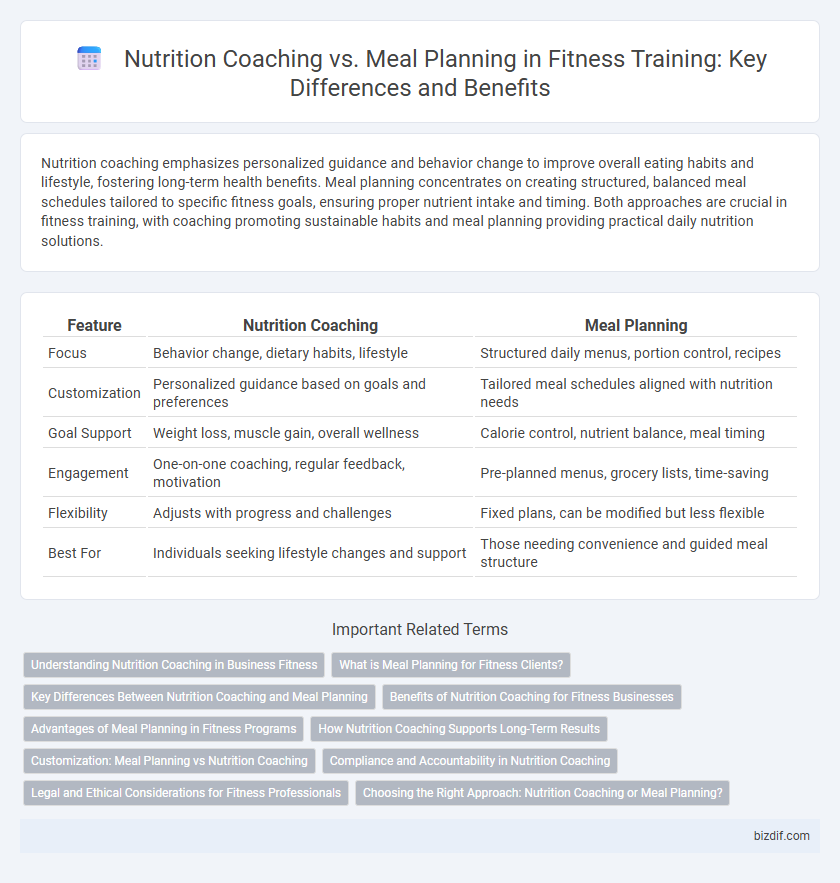Nutrition coaching emphasizes personalized guidance and behavior change to improve overall eating habits and lifestyle, fostering long-term health benefits. Meal planning concentrates on creating structured, balanced meal schedules tailored to specific fitness goals, ensuring proper nutrient intake and timing. Both approaches are crucial in fitness training, with coaching promoting sustainable habits and meal planning providing practical daily nutrition solutions.
Table of Comparison
| Feature | Nutrition Coaching | Meal Planning |
|---|---|---|
| Focus | Behavior change, dietary habits, lifestyle | Structured daily menus, portion control, recipes |
| Customization | Personalized guidance based on goals and preferences | Tailored meal schedules aligned with nutrition needs |
| Goal Support | Weight loss, muscle gain, overall wellness | Calorie control, nutrient balance, meal timing |
| Engagement | One-on-one coaching, regular feedback, motivation | Pre-planned menus, grocery lists, time-saving |
| Flexibility | Adjusts with progress and challenges | Fixed plans, can be modified but less flexible |
| Best For | Individuals seeking lifestyle changes and support | Those needing convenience and guided meal structure |
Understanding Nutrition Coaching in Business Fitness
Nutrition coaching in business fitness emphasizes personalized guidance and behavior change strategies to improve employee health and productivity. Unlike meal planning, which provides specific diet menus, nutrition coaching addresses individual lifestyle, goals, and challenges to foster sustainable eating habits. This approach supports long-term wellness by integrating nutritional education with motivational support tailored to workplace dynamics.
What is Meal Planning for Fitness Clients?
Meal planning for fitness clients involves creating structured, balanced meal schedules that align with their specific fitness goals, such as muscle gain, fat loss, or endurance improvement. This process considers macronutrient ratios, calorie intake, and nutrient timing to optimize energy levels and recovery. Customized meal plans ensure clients receive the essential vitamins, minerals, and proteins necessary to support workout performance and overall health.
Key Differences Between Nutrition Coaching and Meal Planning
Nutrition coaching emphasizes personalized guidance to develop sustainable eating habits, focusing on mindset and behavior changes for long-term wellness. Meal planning provides structured, detailed daily or weekly menus tailored to specific dietary goals, ensuring precise nutrient intake and portion control. While nutrition coaching supports overall lifestyle improvement, meal planning targets immediate dietary execution for optimized fitness results.
Benefits of Nutrition Coaching for Fitness Businesses
Nutrition coaching in fitness businesses offers personalized guidance tailored to individual client needs, enhancing adherence to healthy eating habits and improving overall performance. It fosters long-term behavioral changes through continuous education and motivation, leading to sustained client engagement and retention. Unlike meal planning, nutrition coaching builds client autonomy by empowering informed decisions, which supports better fitness outcomes and business growth.
Advantages of Meal Planning in Fitness Programs
Meal planning enhances fitness programs by providing structured, calorie-specific meals tailored to individual goals, optimizing nutrient timing and portion control for muscle growth and fat loss. It reduces decision fatigue, ensuring consistent adherence to dietary requirements essential for recovery and performance improvement. Meal planning also facilitates tracking macronutrient intake precisely, supporting personalized adjustments that improve workout outcomes and overall health.
How Nutrition Coaching Supports Long-Term Results
Nutrition coaching fosters long-term fitness success by creating personalized strategies that adapt to individual lifestyle changes and preferences. Unlike static meal planning, it emphasizes behavior modification, continuous education, and accountability to ensure sustainable healthy eating habits. This dynamic approach helps clients overcome barriers and maintain consistent progress towards their fitness goals.
Customization: Meal Planning vs Nutrition Coaching
Nutrition coaching offers personalized guidance tailored to an individual's lifestyle, goals, and dietary preferences, promoting sustainable habits through ongoing support and adjustments. Meal planning provides structured, specific menus and recipes designed to meet nutritional needs but may lack the flexibility or behavioral strategies found in coaching. Customization in nutrition coaching adapts dynamically to progress and challenges, whereas meal planning focuses on preset dietary plans aimed at achieving immediate nutritional targets.
Compliance and Accountability in Nutrition Coaching
Nutrition coaching emphasizes compliance and accountability by providing continuous support, personalized goal-setting, and behavior change strategies tailored to individual needs. Unlike meal planning, which offers static dietary guidelines, nutrition coaching involves regular check-ins and feedback loops to adapt and maintain sustainable eating habits. This dynamic approach enhances adherence to nutritional goals and fosters long-term lifestyle improvements.
Legal and Ethical Considerations for Fitness Professionals
Fitness professionals must adhere to strict legal and ethical guidelines when offering nutrition coaching or meal planning services to avoid practicing dietetics without a license. Nutrition coaching typically involves general advice on healthy eating habits, whereas meal planning often requires personalized diet prescriptions that may cross into regulated territory. Understanding state regulations and obtaining appropriate credentials safeguards clients' well-being and protects professionals from legal liabilities.
Choosing the Right Approach: Nutrition Coaching or Meal Planning?
Choosing the right approach between nutrition coaching and meal planning depends on individual goals and lifestyle preferences. Nutrition coaching offers personalized guidance and behavioral strategies to foster long-term healthy eating habits, while meal planning provides structured, ready-to-follow menus tailored to specific dietary needs or fitness objectives. Evaluating factors such as commitment level, desired flexibility, and nutritional knowledge can help determine whether the interactive support of coaching or the practical convenience of meal planning best supports fitness training outcomes.
Nutrition Coaching vs Meal Planning Infographic

 bizdif.com
bizdif.com